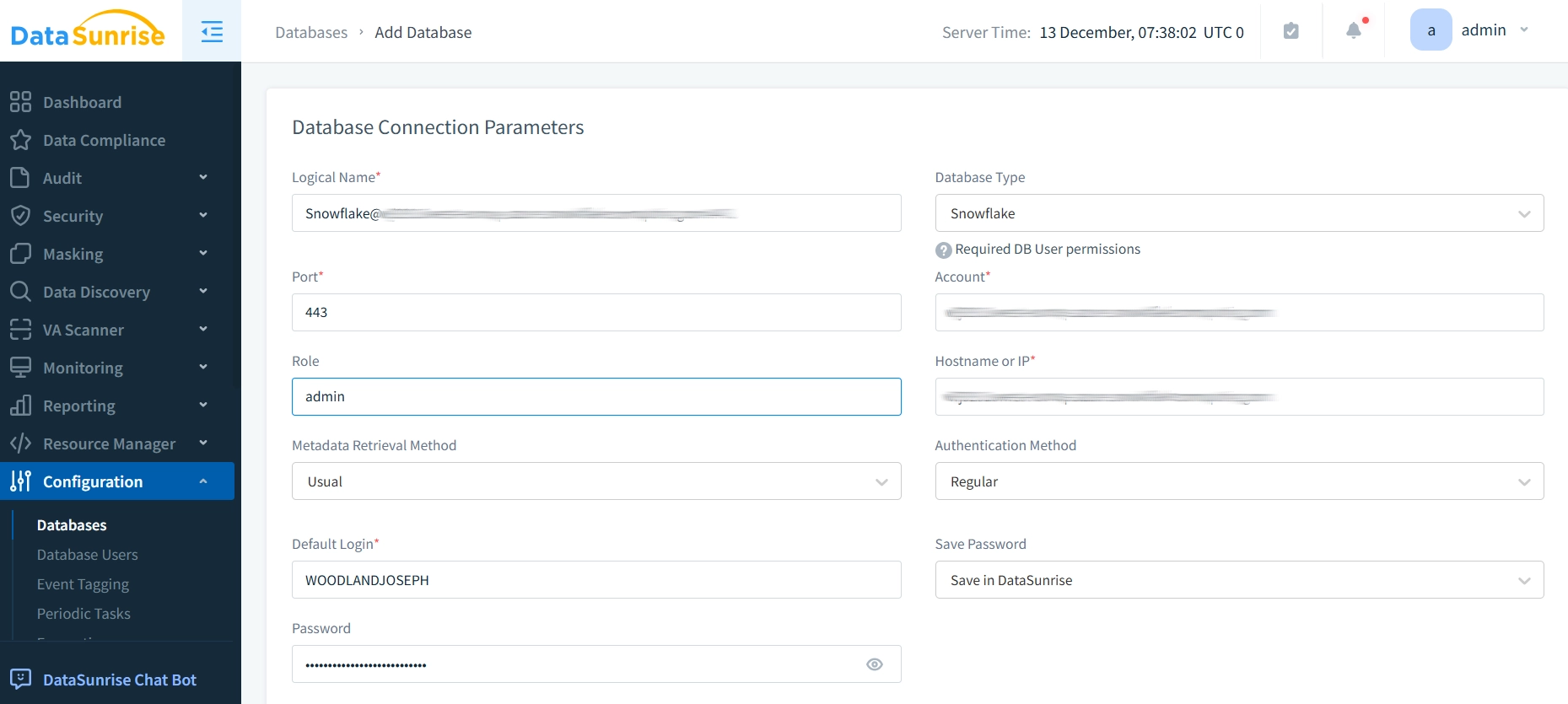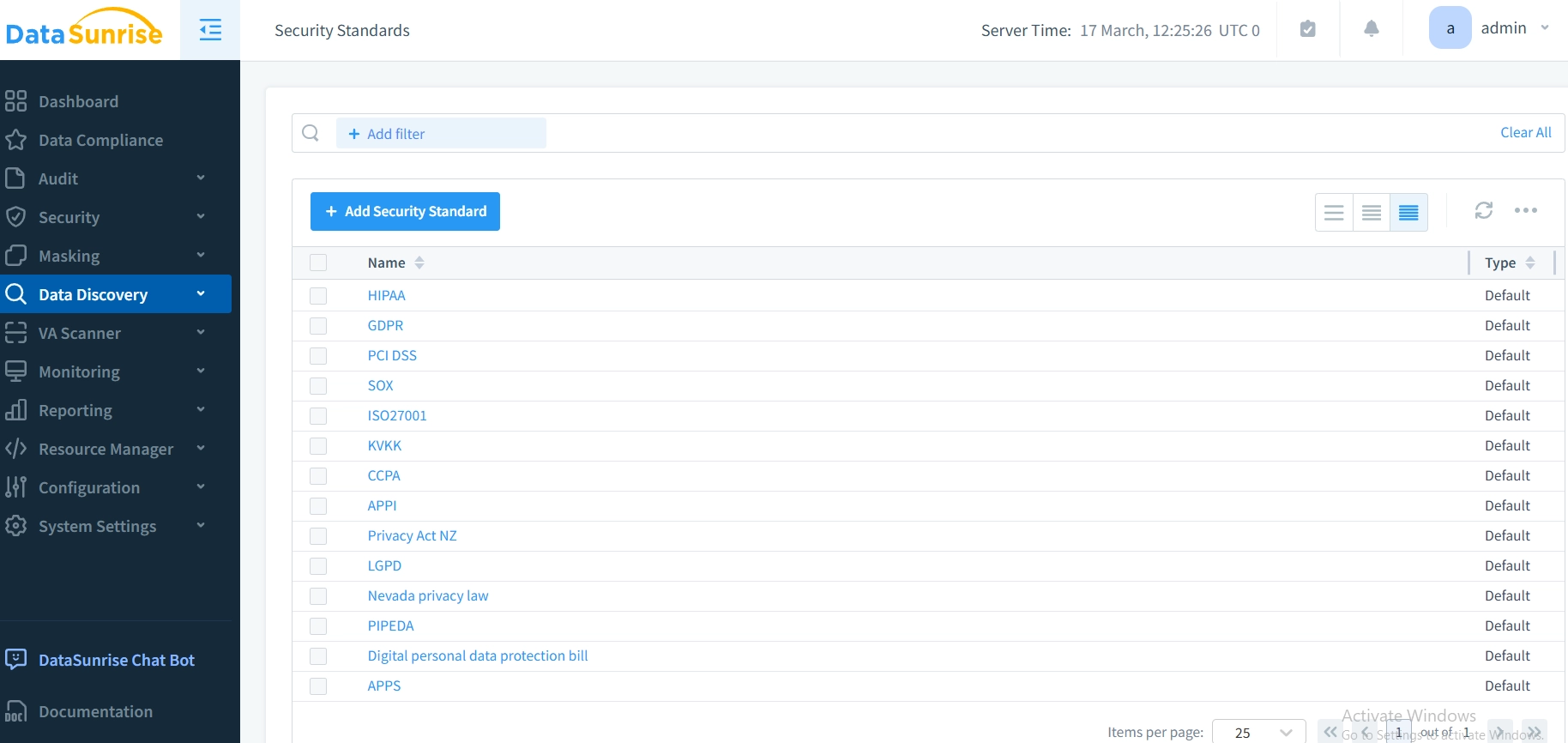
Snowflake Data Governance
In today’s evolving data landscape, implementing robust data governance for Snowflake has become a strategic imperative. According to Forrester’s 2025 Data Protection Report, organizations with automated governance solutions identify potential compliance risks 94% faster and reduce governance-related costs by up to 57%. With the average cost of a compliance breach reaching $5.2 million and security threats increasing by 43% in 2024 alone, comprehensive Snowflake data governance is essential for regulatory compliance and business continuity.
This article explores implementing No-Code Policy Automation for Snowflake data governance through both native capabilities and DataSunrise’s intelligent security solutions.
Understanding Snowflake Data Governance Challenges
Snowflake’s cloud architecture introduces several unique governance considerations:
- Multi-Jurisdictional Data Distribution: Different regulatory frameworks apply simultaneously across regions, creating overlapping requirements.
- Policy Consistency Management: Maintaining uniform governance policies across geographically dispersed instances requires centralized control.
- Continuous Regulatory Evolution: Frameworks like GDPR, HIPAA, and PCI DSS evolve frequently, requiring Continuous Regulatory Calibration.
- Cross-Platform Complexity: Context-Aware Protection is needed where Snowflake coexists with other systems.
- Dynamic Access Patterns: Snowflake’s flexible consumption model creates complex access patterns that static rules cannot effectively govern.
Native Snowflake Data Governance Capabilities
Snowflake provides several built-in features for data governance:
1. Role-Based Access Control
Snowflake implements a hierarchical role system:
-- Create governance-specific roles CREATE ROLE data_steward; CREATE ROLE governance_administrator; CREATE ROLE compliance_officer; -- Grant appropriate permissions GRANT SELECT ON DATABASE financial_records TO ROLE compliance_officer;
2. Dynamic Data Masking
Snowflake offers native data masking to protect sensitive information:
-- Define a masking policy for PII
CREATE OR REPLACE MASKING POLICY pii_full_mask AS
(val STRING) RETURNS STRING ->
CASE
WHEN CURRENT_ROLE() IN ('ADMIN', 'COMPLIANCE_AUDITOR') THEN val
ELSE '********'
END;
-- Apply the masking policy
ALTER TABLE customers MODIFY COLUMN ssn SET MASKING POLICY pii_full_mask;
3. Row-Level Security
Fine-grained access control at the row level:
-- Create row access policy for regional data access
CREATE OR REPLACE ROW ACCESS POLICY regional_data_access AS
(region_name VARCHAR) RETURNS BOOLEAN ->
CURRENT_ROLE() IN ('ADMIN') OR
EXISTS (SELECT 1 FROM user_region_access
WHERE user_role = CURRENT_ROLE()
AND allowed_region = region_name);
4. Access History and Monitoring
Snowflake maintains comprehensive audit trails:
-- Query governance-related activity SELECT query_id, user_name, query_text, database_name FROM SNOWFLAKE.ACCOUNT_USAGE.QUERY_HISTORY WHERE start_time >= DATEADD(day, -7, CURRENT_TIMESTAMP()) AND CONTAINS(UPPER(query_text), 'CUSTOMER');
Limitations of Native Snowflake Governance
While Snowflake’s native capabilities provide essential functionality, they present significant limitations for comprehensive governance:
- Manual Configuration: Role management requires extensive administration that scales poorly
- Limited Discovery: No automated identification of sensitive data
- Static Protection: Masking lacks contextual awareness for dynamic scenarios
- Complex Implementation: Security features require SQL expertise
- Basic Reporting: Difficult to demonstrate regulatory adherence with native tools
- Manual Updates: Policies require reconfiguration as regulations evolve
For organizations in regulated industries or spanning multiple jurisdictions, these limitations necessitate more sophisticated governance automation.
Transforming Snowflake Governance with DataSunrise
DataSunrise’s Database Regulatory Compliance Manager revolutionizes Snowflake governance through proprietary technology specifically engineered for cloud data platforms. Unlike traditional governance approaches, DataSunrise delivers comprehensive protection through its advanced capabilities:
Key DataSunrise Capabilities for Snowflake Data Governance
1. Auto-Discover & Classify Engine
DataSunrise’s proprietary algorithms automatically scan and identify sensitive data across Snowflake environments without requiring manual configuration. This engine applies sophisticated pattern recognition to detect data patterns that traditional classification methods miss, providing up to 95% greater coverage.
2. Policy Orchestration Console
The intuitive DataSunrise dashboard enables teams to create sophisticated governance policies through simple point-and-click configuration. This No-Code Policy Automation eliminates the need for SQL expertise, reducing implementation from weeks to hours.
3. Universal Governance Framework
DataSunrise applies uniform policies across heterogeneous environments, creating a centralized governance layer above Snowflake and more than 50 other supported platforms. This eliminates governance silos when Snowflake operates alongside other database systems.
4. Regulatory Calibration Engine
The platform’s Compliance Autopilot continuously monitors regulatory changes and automatically adjusts protection policies in your Snowflake environment without requiring manual intervention or reconfiguration.
5. Behavioral Security Module
DataSunrise’s Context-Aware Protection technology analyzes user behavior patterns to identify anomalies and dynamically adjust security controls based on risk factors and data sensitivity.
6. Forensic Audit Repository
The comprehensive audit logging system captures Snowflake activities with surgical precision, creating tamper-proof records that satisfy even the most stringent regulatory requirements.
Implementing Zero-Touch Data Governance
Implementing DataSunrise’s governance automation for Snowflake follows a streamlined process:
1. Create Snowflake Instance in DataSunrise – Configure Snowflake connection parameters in the DataSunrise dashboard

2. Select Compliance Frameworks – Choose applicable regulatory frameworks (GDPR, HIPAA, PCI DSS, SOX)
3. Initiate Automated Discovery – AI algorithms identify and classify sensitive data in your Snowflake environment
4. Configure Protection Methods – Define governance controls based on data sensitivity and user roles
5. Set up Automated Reporting – Schedule compliance reports at defined intervals
6. Enable Continuous Monitoring – Access real-time governance metrics through DataSunrise’s centralized dashboard

The entire implementation typically requires less than a day, with minimal technical expertise needed.
Strategic Advantages of Intelligent Governance Orchestration
Organizations implementing DataSunrise’s automated governance solutions experience significant benefits:
- Optimized Resource Allocation: Automated systems handle up to 90% of routine compliance activities, freeing technical teams for strategic initiatives
- Accelerated Regulatory Response: Organizations adapt to new requirements in hours instead of weeks with automatic policy adjustments
- Proactive Risk Intelligence: Behavioral analytics detect unusual access patterns before they escalate into breaches
- Unified Governance Framework: A centralized dashboard eliminates blind spots between different data systems
- Quantifiable Audit Efficiency: Preparation time for regulatory audits decreases by 94% with automated evidence collection
Best Practices for Snowflake Data Governance
| Practice Area | Recommendation | Business Benefit |
|---|---|---|
| Architecture | Design Snowflake topology with governance requirements in mind | Avoids costly retrofitting of governance controls |
| Monitoring | Focus detailed auditing on high-risk operations | Optimizes performance while maintaining visibility |
| Governance Structure | Establish clear ownership of controls with defined responsibilities | Creates accountability for maintaining compliance |
| Tools Integration | Implement DataSunrise Database Firewall alongside native features | Provides comprehensive coverage beyond native capabilities |
| Validation | Regularly test governance framework with simulated scenarios | Identifies potential gaps before compliance violations occur |
Conclusion
While Snowflake provides essential native governance features, organizations with complex regulatory requirements benefit significantly from DataSunrise’s Zero-Touch Data Governance. By implementing automated data protection with No-Code Policy Automation, organizations transform governance from a resource-intensive manual process to an efficient, adaptable framework that continuously evolves with changing requirements.
DataSunrise extends Snowflake’s capabilities with intelligent automation that makes enterprise-grade governance accessible for organizations of all sizes.
Ready to transform your Snowflake data governance strategy? Schedule a demo today to see how DataSunrise can streamline your governance framework while strengthening your overall security posture.
